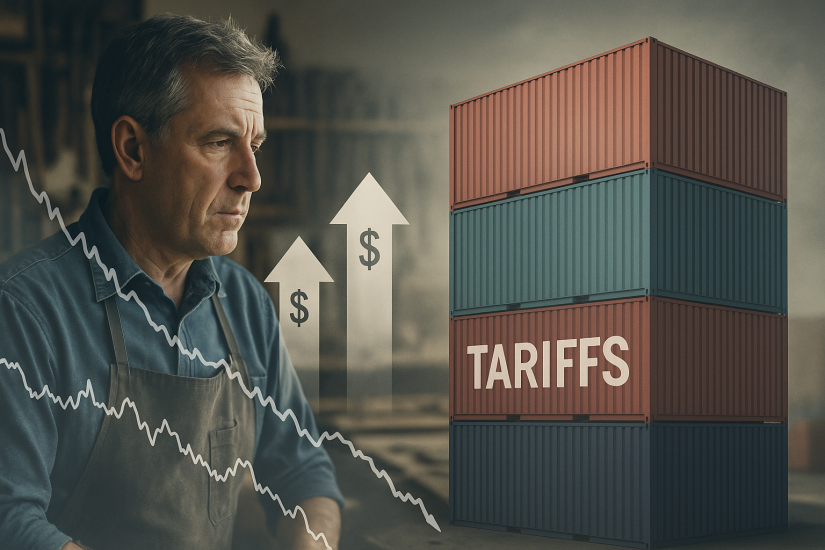April 30, 2025
New Tariffs and Market Volatility Could Impact Valuations
By Matthew Smoorenburg


For small business owners contemplating an exit in the next two to four years, economic conditions play a crucial role in determining valuation and buyer interest. A newly announced round of tariffs by the current administration —targeting a wide range of Chinese, European and other imports—has added fresh uncertainty to the economic landscape. Coupled with a sharp downturn in the stock market and broader fears of an economic slowdown or even a recession, these developments could significantly affect small business resale values and exit strategies.
Rising Costs, Shrinking Margins, and Investor Hesitation
Tariffs essentially function as a tax on imported goods, leading to higher costs for businesses that rely on these materials. Trump’s newly implemented tariffs, which include steep increases on steel, aluminum, automotive parts, and consumer electronics, are particularly impactful for small businesses in the manufacturing, construction, retail, and logistics sectors.
For example, a small construction company dependent on imported steel could see material costs rise 15–25% in a matter of weeks. Similarly, electronics retailers and auto service businesses may face squeezed margins due to price hikes on parts and inventory. These thinner margins can erode EBITDA (earnings before interest, taxes, depreciation, and amortization)—a key valuation metric—making the business less attractive to buyers.
The ripple effect also extends to service industries. Restaurants that rely on imported kitchen equipment or packaging, and retailers dependent on imported shelving or POS systems, may struggle to maintain margins without raising prices—an increasingly risky move in a fragile consumer environment.
Supply Chain Disruptions and Economic Uncertainty
Tariffs do not just increase costs—they also introduce logistical and operational challenges. Many small businesses, operating on tight margins and lean inventories, lack the flexibility to quickly pivot to new suppliers. With the latest tariffs affecting both raw materials and finished goods, business owners may face delays, stockouts, and difficult sourcing decisions.
Additionally, broader economic instability—including a 10%+ drop in major stock indices following the tariff announcement—has spooked investors and created hesitation in the M&A market. Buyers are becoming more selective, increasingly focused on financial resilience and supply chain agility. Businesses perceived as too vulnerable to tariff shocks or consumer pullback may see valuation discounts or reduced buyer interest.
Reduced Consumer Demand and Inflation Pressures
Higher input costs often translate into higher consumer prices—but in the current economic environment, price sensitivity is high. Rising interest rates, stubborn inflation, and recent stock market declines have left many consumers tightening their belts.
Small businesses in discretionary sectors—like furniture retail, travel, fashion, or luxury services—may see sales decline as tariffs raise prices and consumer demand falls. If imported furniture rises 25% due to tariffs, for instance, independent retailers may face significant drops in foot traffic and conversion. Similarly, fuel cost spikes—driven by tariffs on refined petroleum imports—could squeeze profitability for delivery services and logistics firms.
Strategic Considerations for Business Owners Planning an Exit
Given this volatile climate, small business owners need to be especially initiative-taking. Here are key strategies to protect and enhance business value ahead of a potential sale:
1. Diversify Supply Chains
Explore alternative domestic suppliers or international sources not impacted by the latest tariffs. Demonstrating flexibility in sourcing can make your business more attractive to buyers seeking reduced exposure to geopolitical risk.
2. Strengthen Operational Efficiency
Offset rising costs by improving efficiency. This may include renegotiating contracts, investing in automation, or adopting lean inventory practices. Every point of margin improvement matters in this climate.
3. Preserve Profitability and Forecasting Discipline
Focus on maintaining strong and predictable financial performance. Buyers in a risk-averse environment will closely scrutinize past and projected earnings. Clear, defensible forecasting models that account for tariff impacts will position your business more competitively.
4. Monitor the Market and Adjust Strategy
Keep a close eye on policy developments and economic indicators. The trade landscape remains politically driven, and changes can happen quickly. Align your exit timing with market signals and be prepared to adjust expectations or hold off if necessary.
The Role of a M&A Advisors and Business Broker in Navigating Turbulence
In a market clouded by tariffs, market drops, and economic uncertainty, a business broker becomes even more valuable than at any time in the past. An experienced broker can:
– Help assess tariff exposure and value impact
– Develop mitigation strategies
– Structure deals with safeguards (such as earn-outs or seller financing)
– Identify serious buyers with a tolerance for market volatility
Moreover, brokers can position your business effectively in the current environment, emphasizing its resilience, adaptability, and potential for growth despite external pressures.
The latest wave of tariffs and accompanying economic turbulence underscore the importance of planning and flexibility for small business owners eyeing an exit. While challenges like rising costs, weakened consumer demand, and valuation pressure are real, strategic preparation can protect—and even enhance—your company’s marketability.
In uncertain times, businesses that demonstrate resilience, adaptability, and strong fundamentals will stand out to savvy buyers. Now is the time to stress-test your business model, improve efficiencies, and consult with experts who can guide you through the complexities of the current market.
About A Neumann & Associates, LLC
A Neumann & Associates, LLC is a professional mergers & acquisitions and business brokerage firm having assisted business owners and buyers in the business valuation and business transfer process through its affiliations for the past 30 years. With an A+ Better Business Bureau rating, the company has senior trusted professionals with a deep knowledge based in multiple field offices along the East Coast and has performed hundreds of business valuations in its history. The firm’s competitive transaction fees are based on successfully completing transactions. For more information, please contact A Neumann & Associates at 732-872-6777 or info@neumannassociates.com

Leave a Reply